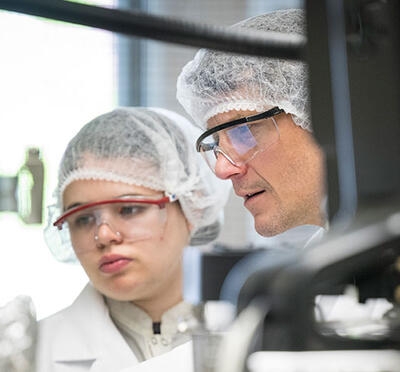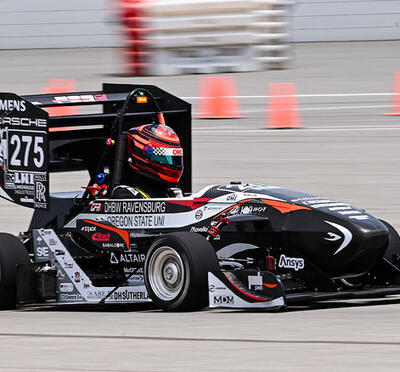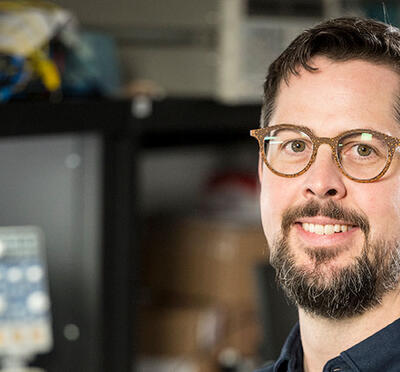While growing up in Dalian, China, Yue Cao was fascinated by trains. How, he wondered, could a locomotive, which resembled a giant toy, be so powerful that it could pull a mile-long line of freight cars? Even the railway switches sparked his curiosity. Anything mechanical, especially machines that moved under their own power, deserved a closer look.
“When I rode public buses, I liked to sit near the front so I could watch the driver shift gears on the manual transmission,” said Cao, now an assistant professor of electrical and computer engineering in the College of Engineering at Oregon State University.
Cao, naturally gifted in math and science, also picked up English quickly. Having professors for parents was beneficial to his progress in both disciplines. (Both are on the faculty at Dalian University of Technology: his father in math, his mother in English.) Cao frequently competed in Academic Olympiads and won several awards, including first place in the Dalian division of the Hua Luogeng National Math Cup, as well as top prizes in several Liaoning province math, physics, English, and computer competitions. He also has a creative side. At age 5, he took up the accordion, leading to an appreciation for music and the arts and giving him a break from academic pursuits.
Given his aptitudes, it’s no surprise that Cao would choose a career in electrical engineering, but getting there was an adventure.
After finishing the 10th grade in 2005, he moved to Knoxville, Tennessee, to finish high school. His mother was pursuing a doctorate in education at the University of Tennessee, and his parents saw an opportunity to widen his horizons. It was a bold choice. The influx of Chinese students at U.S. universities was just starting, but leaving China during high school was truly rare — and a bit risky — since Cao was on track to choose from among the country’s top universities.
Cao quickly made new friends, polished his English, and applied his mathematical talents for the benefit of his new school. With his help, West High won second place in a statewide math competition. That kind of academic achievement was atypical at a school known more for its prowess in athletics. He’d earned a first-place individual award at the competition and later was a USA Math Olympiad finalist. Those accomplishments helped him earn a four-year scholarship to the University of Tennessee. At college, he took up tennis and experienced the thrill of traveling. (He’s visited all 50 states and 13 countries.)
“There’s an old Chinese saying that reading 10,000 books is not as useful as traveling 10,000 miles,” Cao said.
After working as a research scientist in the private sector including Amazon Prime Air, and at a major national laboratory, Cao joined the Oregon State faculty to pursue research in powered electronics. Recently, he turned his attention to mechatronics, a branch of engineering that explores electrically powered mechanical systems.
During his time with Amazon Prime Air he worked on a prototype of the six-rotor unmanned aerial vehicle which Amazon.com Inc. recently announced it will use for its Prime Air package deliveries.
“The vehicle is big, as big around as a formal dining table,” Cao said, stretching his arms out fully to illustrate. Propelled by six rotors, it will need to travel up to 15 miles in under 30 minutes with a payload of up to five pounds.
Cao is continuing research in heavy-duty UAVs to ensure the propulsion systems are efficient, reliable, and robust. “We can’t have it falling out of the sky, and it must work in challenging conditions or even if it’s damaged,” he said.
Package delivery is just the beginning of a revolution in electrically powered vehicles. How about an electric airliner with the passenger capacity of a 737 or even a jumbo jet? Cao predicts that such enormous electrified vehicles will be commonplace in a few decades. “It will probably start with a flying taxi, which, technologically, really isn’t that different than delivery UAV,” he said.
Cao views electrified transportation as an important step toward reducing energy consumption while decreasing greenhouse gas production. “I like to think that my research will contribute to improving quality of life while generating economic opportunities,” he said.
Cao still plays tennis during breaks from his work, and he’s developed a love for snowboarding, which he picked up a couple of years ago. “The first three days were brutal. I was sore all over,” Cao said. “I progressed pretty quickly to the easy slopes and then harder trails. Now, I don’t even pay attention to the difficulty ratings. I just go.”
That seems like a perfect summary of how Cao has lived his life.




